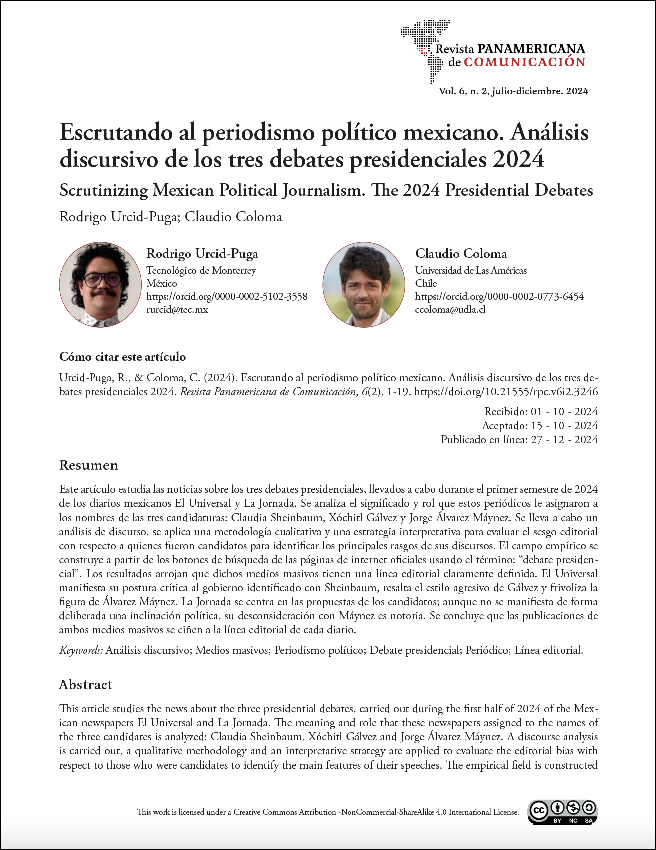Scrutinizing Mexican Political Journalism. The 2024 Presidential Debates
Main Article Content
Abstract
This article studies the news about the three presidential debates, carried out during the first half of 2024 of the Mexican newspapers El Universal and La Jornada. The meaning and role that these newspapers assigned to the names of the three candidates is analyzed: Claudia Sheinbaum, Xóchitl Gálvez and Jorge Álvarez Máynez. A discourse analysis is carried out, a qualitative methodology and an interpretative strategy are applied to evaluate the editorial bias with respect to those who were candidates to identify the main features of their speeches. The empirical field is constructed from the search buttons of the official Internet pages using the term: “presidential debate”. The results show that these mass media have a clearly defined editorial line. “El Universal” expresses its critical stance on the government identified with Sheinbaum, highlights the aggressive style of Gálvez’s campaign and publishes articles that appeal more to entertainment than to information. La Jornada focuses on the proposals of those who ran for the presidency although an inclination towards a person is not deliberately manifested; however, the disregard for Máynez is notorious in relation to El Universal. It is concluded that the publications of both newspapers adhere to the editorial line that each one has.
Article Details
References
Angenot, M. (2020). El discurso social. Los límites históricos de lo pensable y lo decible. Siglo XXI editores.
Coloma, C. (2024). Back to the future: re-examining John Mearsheimer’s idea of hypernationalism in the context of the Russian-Ukrainian war. Critical Studies on Security, 12(3), 301-317. https://doi.org/10.1080/21624887.2024.2379146
Coloma, C., & Urcid-Puga, R. (2023). Buscando al enemigo: comunicación política y estratégica del gobierno mexicano ante la guerra Rusia-Ucrania. URVIO Revista Latinoamericana de Estudios de Seguridad, (37), 28-44. https://doi.org/10.17141/urvio.37.2023.5976
Dader-García, J. L. (2022). Periodismo político y política del periodismo: imaginando un futuro digno y sostenible. En: Berrocal-Gonzalo, S. & Campos-Domínguez, E. (Coords.), La investigación en periodismo político en el entorno de los nuevos medios de comunicación (pp. 35-58). Sociedad Española de Periodística.
Darío, R., & Astudillo, F. (2023). Periodismo por dentro. Una pausa en medio del vértigo. Editorial Quipus y Ciespal.
De-Saussure, F. (2012). Course in general linguistics. Kindle Edition.
Derrida, J. (1994). Spectres of Marx: The state of the debt, the work of mourning and the new iInternational. Routledge.
Di-Doménica, S. (2019). Periodismo político en la era digital: enfoques y formatos para ampliar audiencia. Grado Cero. Revista de Estudios en Comunicación, 1, 1-23. https://publicacionescientificas.uces.edu.ar/index.php/grado/article/view/863
El Universal. (2024). Breve historia del periódico El Universal. https://www.eluniversal.com.mx/historia-breve
Enguix, S. (2021). Periodismo político. Fundamentos, prácticas y perspectivas. Global 31.
Glynos, J., & Howarth, D. (2007). Logics of critical explanation in social and political theory. Routledge.
Hellmueller, L. y Mellado, C. (2020). Journalistic role performance and the networked media agenda: A comparison between the United States and Chile. En L. Guo, & M. McCombs (Eds.), The power of information networks: New directions for agenda setting (pp. 119-132). Routledge. https://doi.org/10.4324/9781315726540
Íñiguez, L. (2021). Análisis del discurso. Manual para las ciencias sociales. Editorial UOC.
Kraus, S., & Davis, D (2020). Comunicación masiva: sus efectos en el comportamiento político. Trillas.
Laclau, E. (2014). The rhetorical foundations of society. Verso.
Narvaja, E. (2021). El análisis del discurso en Latinoamérica: Objetos, perspectivas y debates. Revista Signos, 54(107), 711-735. https://revistasignos.cl/index.php/signos/article/view/822
Pinsetta, P. R., Laisner, R. C., Abba, M. J., Elías, S., Streck, D. R., & Korsunsky, L. (2021). Universidad, internacionalización, regionalización: notas para la línea editorial y presentación. Revista REDALINT, 1(1), 5-13. https://revele.uncoma.edu.ar/index.php/redalint/article/view/3086
Reyna-García, V. H. (2021). Los estudios sobre el periodismo digital en México: dos décadas de investigación dispersa. Comunicación y Sociedad, 18. https://doi.org/10.32870/cys.v2021.7846
Romero-Lizama, P. S. (2020). Discurso, ideología y medios: El periodismo de libre mercado en Chile. Question, 1(65), 1-17. https://doi.org/10.24215/16696581e249
Salvatierra, L. (2021). El análisis del discurso en el campo Comunicación/Educación. Aportes y estrategias de articulación. Actas de Periodismo y Comunicación, 7(1), 1-9. https://perio.unlp.edu.ar/ojs/index.php/actas/article/view/7054
Sayago, S. (2023). Representaciones sociales en la prensa. Una propuesta de análisis desde un enfoque materialista del discurso. En Pascual, M. (Comp.). Los estudios del discurso en la Argentina Actual. Nuevos desafíos, nuevas miradas (pp. 347-362). San Nueva Editorial Universitaria.
Steimberg, O. (2020). Continuidades y rupturas en la narrativa de la historieta costumbrista. En O. Steimberg, O. Traversa, & Cingolani, G. (Coords.). Actas del 14° Congreso Internacional de Semiótica: Trayectorias (pp. 300-406). Libros de Crítica.
Van-Dijk, T. A. (Coord.) (2021). El discurso como estructura y proceso. Gedisa.
Žižek, S. (2008). The sublime object of ideology. Verso.


